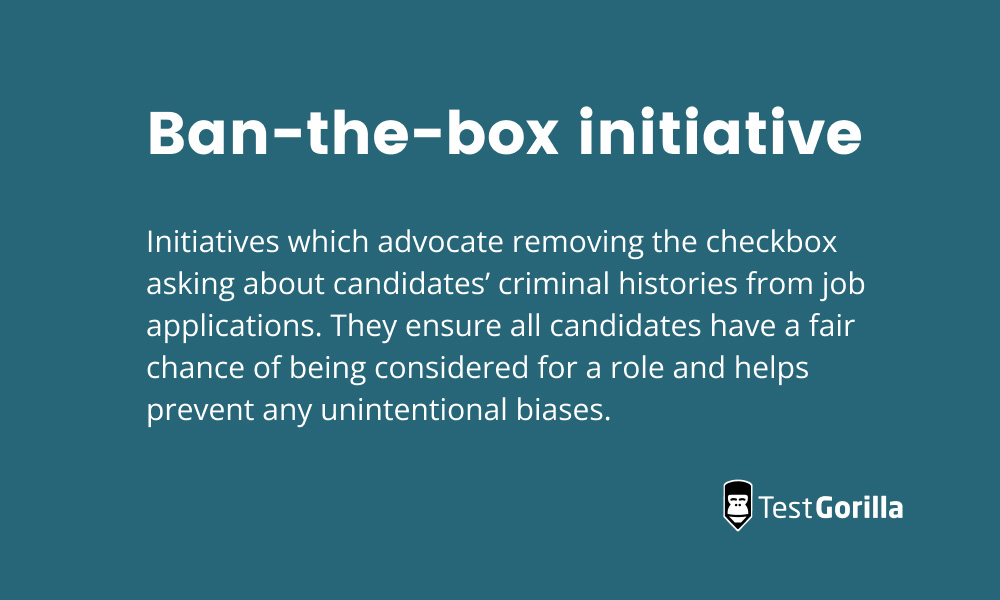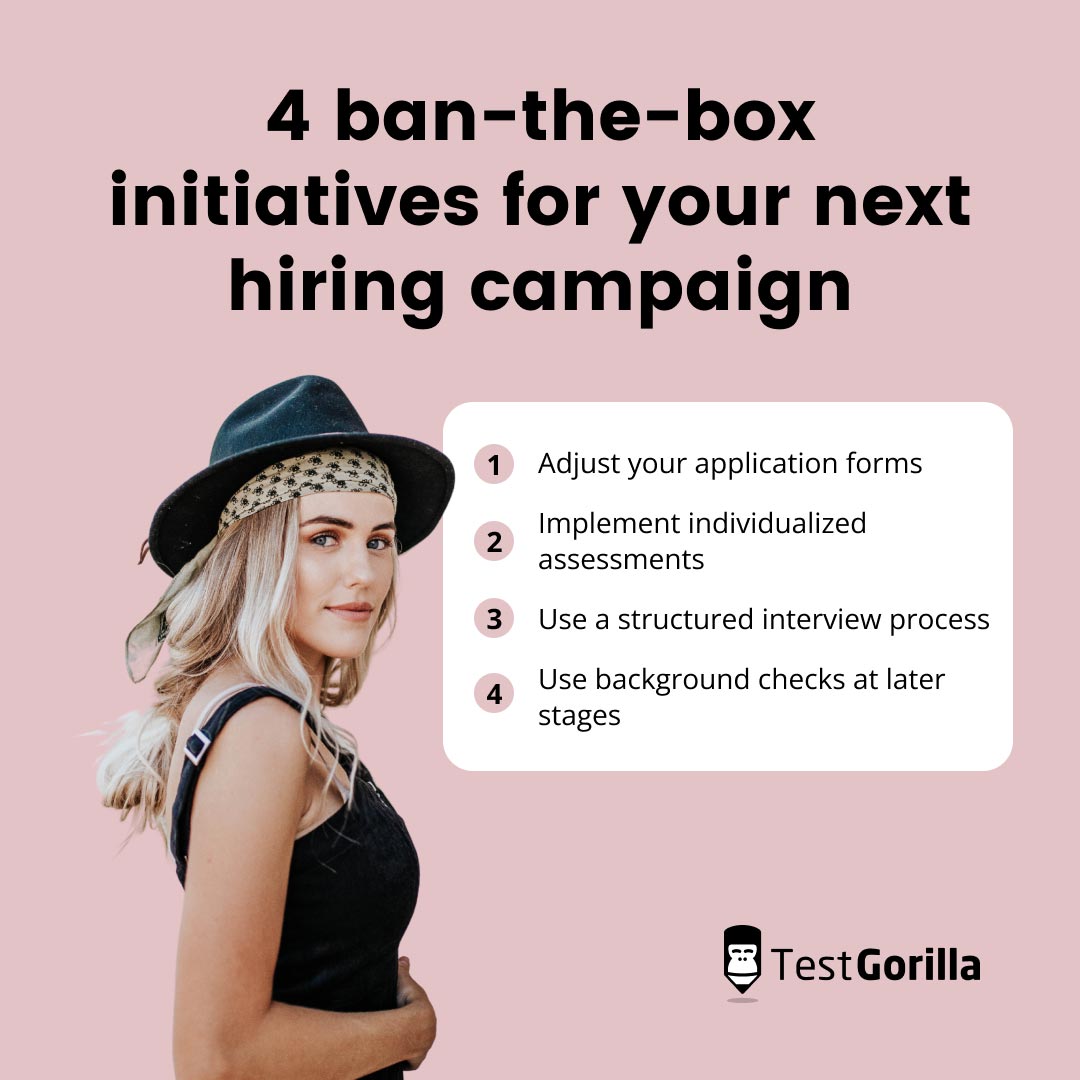Starting your hiring process with criminal background checks might mean you miss out on some great candidates in your applicant pool. It can also harm your reputation for inclusivity and discourage other applicants.
However, Ban the Box initiatives strive to give all candidates a fair chance at landing the job. Using them in your hiring processes can even improve your employer branding by showing people that you care about equity.
This article explains what Ban the Box initiatives are, who they affect, and how they impact your hiring process. We then share four initiatives you can use in your hiring process to hire candidates based on their qualifications – and not on their records.
What are Ban the Box initiatives?
Ban the Box initiatives advocate removing the checkbox asking about candidates’ criminal histories from job applications. The name refers to the Ban the Box campaign that began in the 1990s.
The main goal of these initiatives – which are promoted by various advocacy groups, individuals, and organizations – is to create policies and laws requiring the removal of this checkbox.
They ensure all candidates have a fair chance of being considered for a role before employers look at their criminal backgrounds. This helps prevent any unintentional biases in the early stages of the hiring process and helps promote equal opportunity in your recruitment process.
These initiatives proved successful with the creation of the Fair Chance to Compete for Jobs Act of 2019 (FCA). This criminal background check law bans federal employers from asking applicants for information about their criminal records until they’ve made a conditional job offer. Since December 2021, this law has taken effect in 37 states and more than 150 cities.
Learn more: 37 states with Ban the Box laws
However, critics claim that Ban the Box initiatives have disadvantages. For example, they worry these initiatives can cost employers valuable time and money in cases where they extend job offers to individuals with criminal records and later need to rescind them due to concerns about safety or suitability.
But the primary benefit of these initiatives – giving candidates with criminal records a fair chance at employment – is one employers should embrace. By including these initiatives in your hiring process, you allow these candidates to demonstrate their skills and suitability for the role before disqualifying them.
Who is affected by Ban the Box initiatives?
Ban the Box initiatives affect both employers and candidates but in different ways.
Ex-offenders
People who have served time in prison or have criminal records often face significant barriers when trying to re-enter the workforce. In fact, approximately 60% of Americans who are released from prison struggle to secure employment for up to one year after being released. Reasons for this include low self-esteem, lack of necessary qualifications, substance abuse, and, unfortunately, employer discrimination.
Applicants with criminal records are the most directly affected by Ban the Box initiatives. Without these initiatives, employers often disqualify individuals before the interview stage.
Ban the Box initiatives can help reduce the immediate stigma associated with criminal records and increase the chances of ex-offenders securing a job. By delaying inquiries into your candidate’s criminal history, you allow them to make a positive impression in the pre-screening stages of the hiring process.
Communities affected by mass incarceration
Ban the Box policies can also indirectly benefit communities with high incarceration rates by increasing employment opportunities for individuals with criminal records. Members of these communities who have the chance to re-enter the workforce and earn a stable income are less likely to become repeat offenders.
These individuals’ criminal records – especially records with repeat offenses – also make it challenging for them to reintegrate into society. When more individuals from these communities re-enter employment with the help of these initiatives, poverty levels can improve, as can community members’ well-being.
Employers
As an employer, Ban the Box initiatives and laws don't affect you in the same way as your applicants. Ban the Box merely affects your rules for hiring in ways that help you remain unbiased, thus reducing your chances of unfair hiring while diversifying your team.
Depending on your location, however, Ban the Box laws may affect when you can conduct a background check. In states like California, for example, you can only make inquiries into a candidate’s criminal history once they’ve passed the pre-screening assessments and interview stages and you’ve provided them with a conditional job offer.
You’ll want to confirm if Ban the Box laws are enacted in your state to avoid penalties. Even if they aren’t, using Ban the Box initiatives at your company is a meaningful endeavor.
The best insights on HR and recruitment, delivered to your inbox.
Biweekly updates. No spam. Unsubscribe any time.
4 Ban the Box initiatives for your next hiring campaign
Integrating Ban the Box initiatives into your hiring campaign allows you to treat your candidates fairly while showcasing your organization's commitment to diversity and inclusion hiring.
Here are four Ban the Box initiatives you might use.
1. Adjust your application forms
Re-designing your application forms doesn’t require significant changes. You'll support Ban the Box initiatives simply by removing the checkbox that asks about your candidate’s criminal history. If you use a digital screening platform, adjust the shortlisting criteria to remove any subsections that ask about your candidate’s criminal history.
In doing this, you won’t eliminate candidates before they have a chance to prove themselves. You also won’t inadvertently deter great candidates from applying by sending the message that your company lacks inclusion or doesn’t care about equity.
2. Implement individualized assessments
Instead of focusing on applicants’ criminal histories, use assessments to evaluate their skills and traits objectively. This way, they can let their strengths outshine their criminal record.
Individualized talent assessment tests – such as personality assessments, skills tests, and behavioral assessments – can help you determine your candidates' abilities and potential job performance. TestGorilla makes this easy, offering a range of user-friendly skills and aptitude tests that candidates can complete from their mobile devices.
3. Use a structured interview process
Implement structured interviews with a standardized set of questions. This way, you can ask all candidates the same questions to assess their cultural fit, competencies, and skills for the role – without judging their criminal history.
4. Use background checks at later stages
Consider conducting criminal background checks after your candidates have progressed through initial assessments and interviews if you aren’t already required to do so. Your organization can ensure this happens by enacting policies that require hiring managers to conduct background checks at later stages in the hiring process.
This approach ensures that you make informed decisions while giving all candidates a fair chance to demonstrate their capabilities. It also conveys that your company values equality policies that foster diversity and inclusion when hiring.
Use TestGorilla to incorporate Ban the Box initiatives into your hiring process
Ban the Box initiatives are practices that level the playing field for all applicants by removing any questions about their criminal histories from the initial stages of the hiring process. By incorporating Ban the Box principles into your hiring campaign, you foster diversity and nurture a work environment where everyone has the chance to succeed.
Give applicants with criminal backgrounds an equal opportunity during hiring through pre-employment testing. This is the best way to assess candidates compared to relying solely on resumes and interviews. TestGorilla’s 300+ research-backed pre-employment screening tests can help you make informed and unbiased hiring decisions.
Take our product tour and sign up for our free plan to diversify your workforce and select top candidates fairly and equitably.
Related posts
You've scrolled this far
Why not try TestGorilla for free, and see what happens when you put skills first.
















